First, she heard a ping, then the sound of something hitting her boat.
It was 1975, and Norma Cagey, only 18 years old at the time, was alone with her husband on the calm waters of the Hood Canal, a tree-lined fjord in Washington state.
A member of the Skokomish Indigenous nation, Cagey was using nets to catch Coho salmon when a series of strange noises interrupted the tranquil: whirs, pings and thuds. That’s when the couple realised they were being shot at.
Cagey’s husband quickly turned on the boat motor, and the pair sped off. But the memory lingers with Cagey to this day.
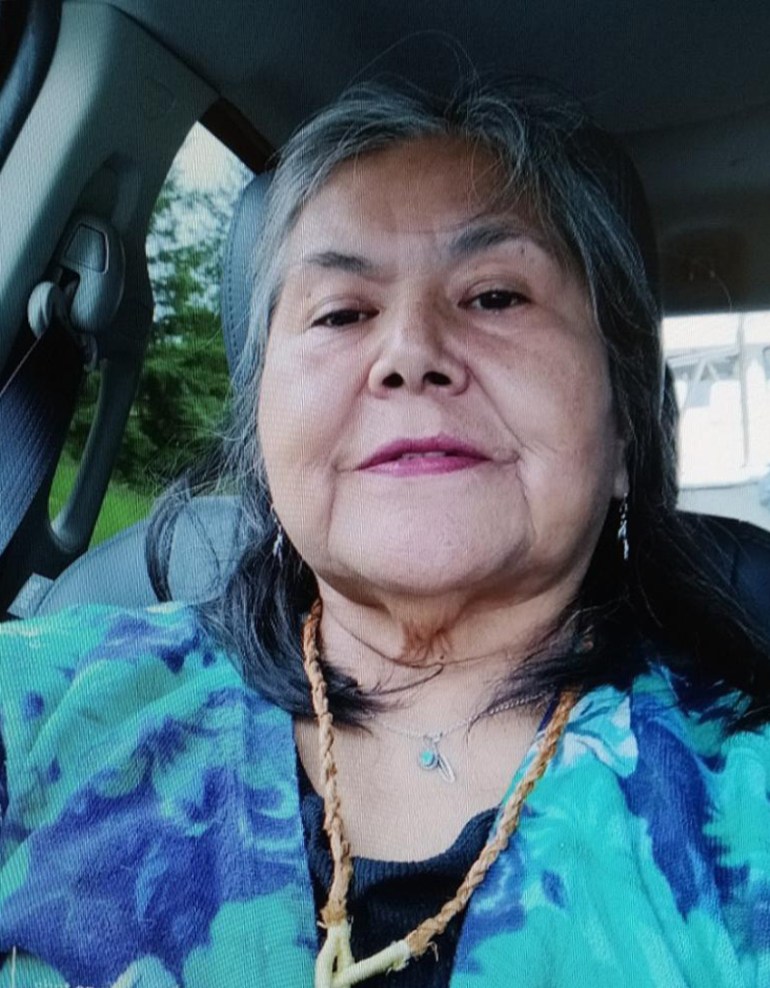
Indigenous fisher Norma Cagey said she faced gunfire for casting nets in her ancestral territory [Courtesy of Norma Cagey]
“We were scared. It took a few days for us to get back out there. We needed the money,” Cagey told Al Jazeera.
She believes she was targeted as part of the “fish wars” in the 1960s and ’70s: a string of clashes over Indigenous fishing rights in the Pacific Northwest region of the United States.
But 50 years ago, on February 12, 1974, a federal court decision would change the course of the conflict, delivering a compromise that remains controversial to this day.
The Boldt decision — named for its author, Judge George Boldt — upheld the Indigenous right to fish in Washington state, delivering a high-profile win to local tribes.
What’s more, it designated that Indigenous peoples could claim a share of the catch equal to that of non-Indigenous fishermen. In other words, the state’s fish harvest would be split 50-50.
Cagey was among the Indigenous residents present in court that day. She remembers a packed house, with tribe members decked out in regalia, hippies in tie-dye and Indigenous elders, comfortable in their everyday clothes.
“It was a surprise to see how many people turned up to support the Natives,” said Cagey, now a member of the Skokomish Tribal Council.
She considers the ruling a victory, albeit limited: “If you look at the history of Native Americans, we lost everything. We wanted a lot more, but we got some. And we can work with some.”
But others believe the Boldt decision was a setback, setting the stage for hurdles that persist into the present.
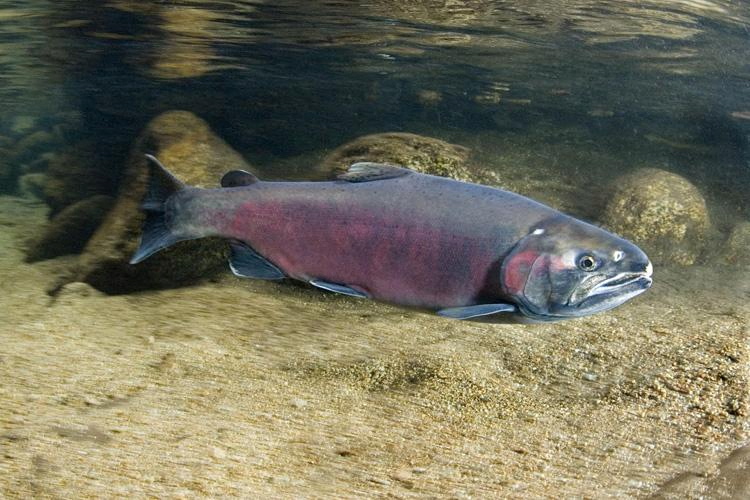
Coho salmon are among the species native to Washington state in the US [NOAA Fisheries handout/Reuters]
Fishing as an act of protest
The Boldt decision arrived in the twilight of the US civil rights movement, a time of racial awakening and cultural reckoning that started in the 1950s.
It was an era of civil disobedience, when Black and brown protesters took to the streets to denounce racial segregation and other discriminatory practices.
One of the most iconic forms of protest at the time was the sit-in. Demonstrators would occupy spaces where they ordinarily were not allowed, bellying up to segregated lunch counters or plopping down at segregated libraries where they would then refuse to move.
In the Pacific Northwest, Indigenous protesters created their own version of the sit-in: a fish-in.
The idea was to arrive at a waterway where they might otherwise be barred from fishing — and cast their nets en masse, defying orders to leave.
The tactic was part of a shift in the Indigenous rights — or “Red Power” — movement. Certain older Indigenous-led organisations had previously resisted the idea of public protest with slogans like “Indians Don’t Demonstrate”.
The fish-ins ultimately attracted major media attention and celebrity participants. Gary Peterson, 79, the former business manager of the Skokomish tribe, remembers that Academy Award winner Marlon Brando and comedian Dick Gregory took part.
“People were seeing it on the news every night,” Peterson said. “There were prominent people like Marlon Brando getting arrested.”
But unlike the fight to end racial segregation, the Indigenous protesters behind the fish-ins were not seeking assimilation. They were seeking sovereignty.
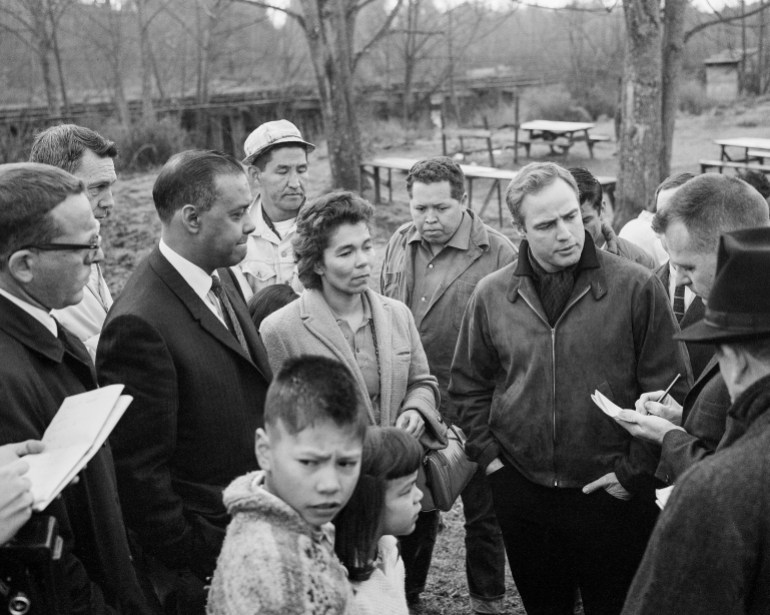
Actor Marlon Brando, right, speaks to the press in 1986 alongside Indigenous leader Janet McCloud, centre [Courtesy of the Museum of History and Industry/Seattle Post-Intelligencer Photograph Collection]
‘This paper secures your fish’
The US government had recognised certain Indigenous tribes as sovereign nations — at least, on paper. In practice, however, the treaties it signed with these nations were often violated with little consequence.
Such was the case in the Pacific Northwest. In the 1850s, Isaac Stevens, the first governor of the Washington Territory, drew up several treaties establishing the local tribes’ right to fish at “all usual and accustomed grounds”.
But the treaties served primarily as vehicles to strip Indigenous peoples of their land. Historians underscore that Stevens took advantage of language barriers — and threatened military force — to ensure the documents were signed.
Altogether, 64 million acres (25.9 million hectares) of Indigenous territory came under Stevens’s control. Still, he pledged to uphold tribal fishing rights.
“This paper secures your fish. Does not a father give food to his children?” Stevens reportedly said during one treaty negotiation.
Species like salmon were integral to the Indigenous communities in the region: They were a primary food source and an important part of spiritual life.
“It may sound foreign to people, but [fishing] is tied into our culture and who we are,” said Amber Taylor, the assistant director of the Puyallup Tribe’s Historic Preservation Department.
“So much so that when Stevens came to negotiate the treaty, our ancestors had the foresight to include those prefaces because we relied on them so heavily for our sustenance.”
But as settlers moved into the Washington Territory, access to ancestral fishing spots became increasingly fraught.
And then there was the population decline. The number of salmon had plummeted by the 20th century.
Manmade changes to the environment — including the canal between Lake Washington and Puget Sound, the dredging of the Duwamish River and various hydroelectric dams — had disrupted fish migration patterns, impeding their ability to breed.
Other factors like commercial fishing, urban development and pesticides also played havoc with the salmon populations. The shrinking number of salmon ultimately increased competition for fish harvests which, in turn, spurred hostility.
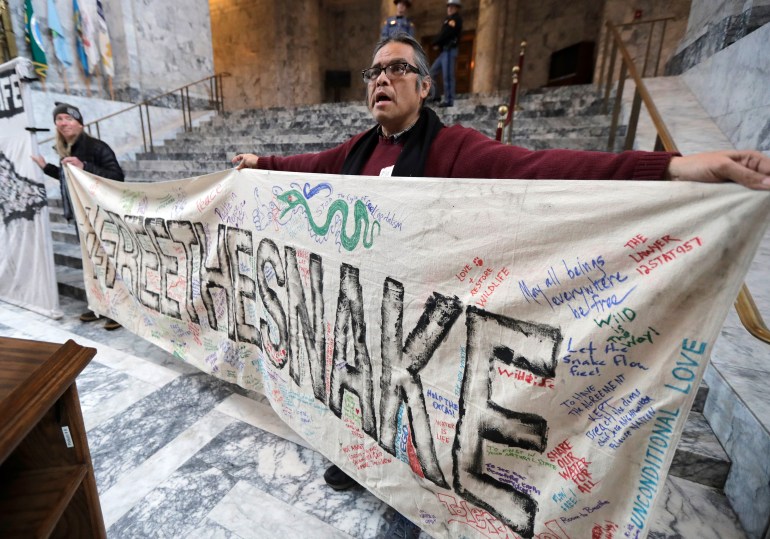
Nez Perce activist Elliott Moffett advocates for removing the dams along Snake River at Washington state’s Capitol building on June 9, 2022 [File: Ted S Warren/AP Photo]
Violence on the water
By the 1950s, the state of Washington sought to impose restrictions and regulations on Indigenous fishers, to bring them under state control. Arrests were made, charges were filed and tribe members had their gear confiscated or destroyed.
Peterson, the former Skokomish business manager, explained that non-Indigenous fishermen even targeted them for reprisals, fearing competition for their catch.
“There were a lot of angry non-Indian fishermen. They would bring cement blocks and throw them into Indian fishing nets and try to sink them. It always felt unsafe,” he said.
Indigenous residents took to fishing at night so they could maintain their cultural traditions and earn a livelihood with the least amount of violence, Peterson added.
Tensions came to a head in September 1970. Indigenous leaders had set up a six-week encampment on the Puyallup River, and violence broke out as police tear-gassed those present. Sixty people were ultimately arrested, including children.
Stan Pitken, a federal prosecutor, was there that day. What he witnessed would inspire him to file the court case United States v Washington. It argued that Washington state had not upheld the legally binding treaty rights it had made with tribes in the 1850s.
“To me, it was a matter of getting the federal government to do what they were supposed to always do,” Peterson said.
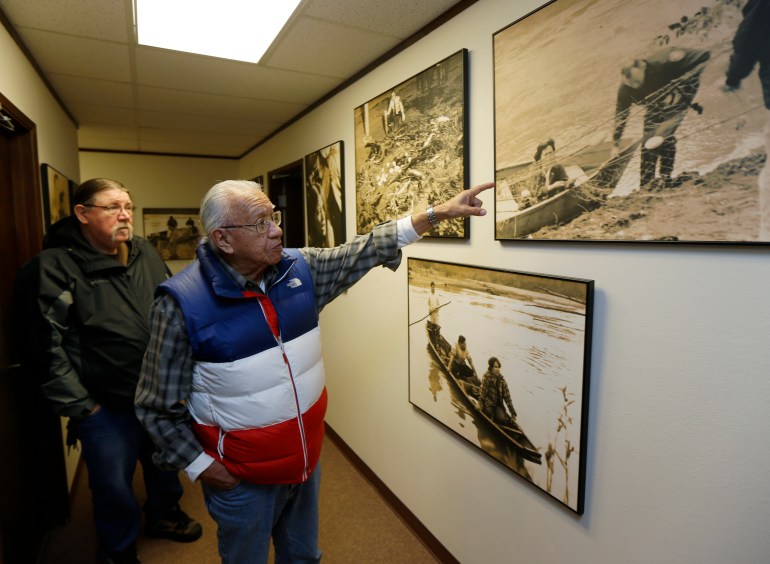
The late Nisqually tribal elder Billy Frank Jr in 2014 points to a photograph showing his wife Norma being arrested during the ‘fish wars’ of the 1960s and ’70s [File: Ted S Warren/AP Photo]
A breakthrough with a catch
Three years passed before the case finally reached trial. When the Boldt decision was finally pronounced, there was celebration that tribal fishing rights had been upheld — a breakthrough nearly a century in the making. The case was hailed as a major win for tribal sovereignty.
But that victory was tinged with downsides. It would take years for the decision to be fully implemented, and provisions like the division of the fish harvest sparked immediate criticism.
“My grandma said we lost 50 percent of the fish when the Boldt decision landed,” said Taylor of the Puyallup Historic Preservation Department. “We really did — in a lot of folks’ minds — lose 50 percent of the harvest.”
In addition, the Boldt decision created boundary lines between tribes that did not previously exist.
Quoting the 1850s treaties, the decision re-asserted the right for Indigenous peoples to catch fish at “all usual and accustomed grounds”. But what those grounds were had not been legally established.
“The language in the Boldt decision complicated things,” Peterson said. “They hired an anthropologist to find out each tribe’s ‘usual and accustomed fishing areas’. It created boundaries where there had been none before.”
Colville Tribe member Pam James, the tribal liaison for the Washington State Historical Society (WSHS), explained that dividing up territory was not a part of traditional Indigenous culture.
“When we think about pre-contact, the resources were shared,” she explained.
But the Boldt decision changed that, demarcating areas for each tribe’s use.
“When these boundaries were put in, it didn’t just impact our fishing. It impacted our food, our food sovereignty and our medicines,” James said. “There are places we can’t go to gather. Now we have to get permits to go into national forests to gather our medicines.”
She added that the violence Indigenous fishers faced did not necessarily abate right away.
“After the Boldt decision, I think some of the violence was worse,” James said. “I remember being out on the beach digging clams and being shot at. We all had those kinds of experiences.”
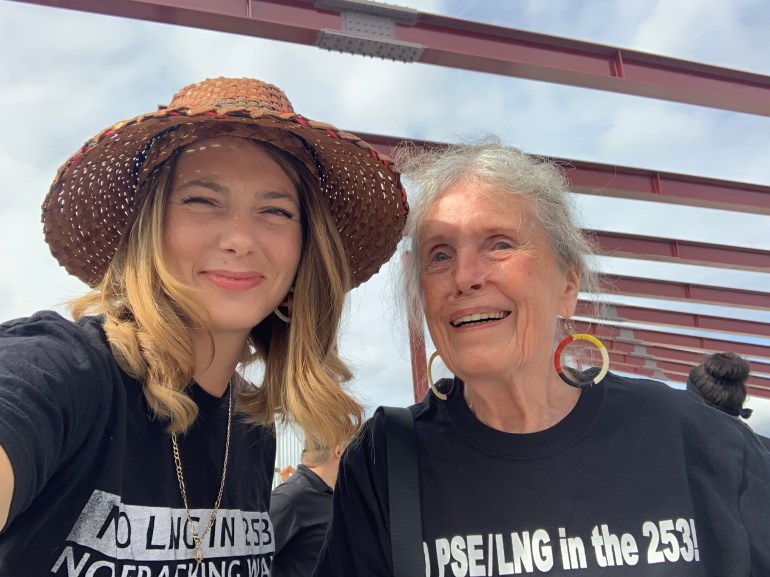
Amber Taylor of the Puyallup Tribe, left, says her grandmother Ramona Bennett considers that the Boldt decision cost Indigenous tribes ’50 percent of the fish’ [Courtesy of Amber Taylor]
From the Boldt decision forward
Fifty years on, tribes in the Pacific Northwest are still fighting to maintain their ancestral ways of life. A 2021 report from Washington state’s Salmon Recovery Office found that several salmon populations in the region “still are teetering on the brink of extinction”.
That prospect is alarming to Taylor, from the Puyallup Tribe’s Historic Preservation Department.
“I was raised with my grandmother telling us that every river has a group of Native people who are there to protect the salmon and to ensure they are cared for,” she said. “Within my own family, we have a belief that when the salmon are gone, we are gone.”
She pointed to Indigenous culture as an example of sustainable living practices. “What we learn when we are out in the water is how to be a good steward. Our people have only taken what they needed.”
For James, the Boldt decision is a powerful reminder of the importance of holding federal and state powers accountable.
“One of things we always forget is there are three sovereigns in this nation: federal, state and tribes. We are sovereign nations. We stand shoulder to shoulder with the federal government,” she explained.
She warned, though, that the outcome of such cases has traditionally been unfavourable to Indigenous peoples. To her, the legacy of the Boldt decision is largely one of economics: How can tribes stay afloat financially while preserving their culture?
It’s a question, James indicated, that is vital to ensuring traditional foodways like the salmon harvest can endure for future generations.
“When I think about the future, I always say I do this work for my granddaughter. I don’t want her to read about who she is in a book. I want her to know it, experience it and pass it on to her grandchildren.”
News Related-
Antoine Dupont still hurt by 'injustice' of World Cup loss to Springboks
-
China's New Aircraft Carrier Begins Catapult Testing
-
Aircraft Downed Inside Russia By Patriot System: Ukrainian Air Force
-
“Am I Prog’s Taylor Swift? That’s a debate that could run and run”: why Peter Hammill re-recorded his Enigma-era albums
-
Car With Pro-Russian Fighters Blown Up by Resistance: Exiled Mayor
-
Europe and African nations must find effective common ground in dealing with migration influx
-
Springbok lock opts not to renew contract with URC team
-
Pravin Gordhan’s deathly legacy: A threat to SA’s economic future
-
Antoine Dupont STILL hurt by ‘injustice’ of Rugby World Cup loss to Springboks
-
Rubber stamping NHI Bill will have damaging consequences for SA for generations
-
Inside horrific conditions Hamas hostages suffered including losing 15lbs in 50 days
-
After the Bell: SA’s NHI healthcare disaster starts right here
-
Gupta-linked development land for sale
-
Gary Neville begrudgingly claims brilliant Man Utd midfielder ‘looked like a Man City player’ in Everton mauling
